Interview: Tom Littler Talks PICTURES OF DORIAN GRAY at Jermyn Street Theatre
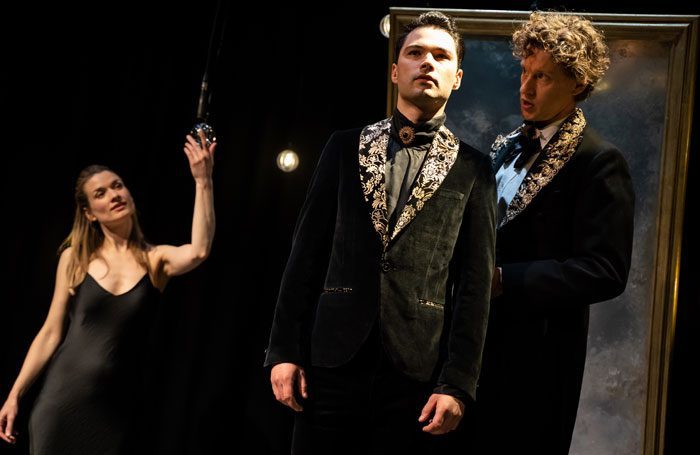
and Richard Keightley in
Pictures of Dorian Gray
Jermyn Street Theatre end their Portrait Season with Pictures of Dorian Gray, an exciting new take on Oscar Wilde's masterpiece directed by Tom Littler.
Four actors juggle their roles, switching nightly (or, on matinee days, twice daily), presenting four different gender combinations that shine a new light on the story. We caught up with the director to learn more about the project, and his long-standing link to Dorian Gray.
What made you want to become a director?
God, this is a long time ago! [Laughs] I think the thing that started me as a director was about actors and acting. And realising that sometimes I could be useful as a person outside of it who could guide them in some way, or who could say the thing that would unlock a moment for them. As time has gone on, I suppose as you mature as a director; that absolutely stays, but you also become more interested in telling stories alongside it.
It's about creating worlds that audiences can get lost in. In the past few years, I've been doing a lot work that's quite emotionally demanding of an audience, that takes them where they don't necessarily want to go but that opens up a little chamber in their heart and nudges them into a territory that's uncomfortable but also exciting to spend time in.
Is there anything you wish you'd known before you started?
No, I think progress, development, getting better as an artist just happen organically at the speed that it happens at - sort of in relation to whatever's happening in your life and whatever you're going through. If somebody had told me some of the things that I now know, I don't think they'd have meant the same thing without my having to experiencing them and their taking the time that they took. So, of course, there are things that I know how to do better than I could previously and there are things I can't do as well. But I don't think they can be told, they just have to be experienced.
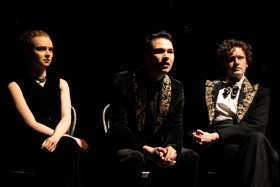
and Richard Keightley in
Pictures of Dorian Gray
Is there anything you want to direct but still haven't had the chance to?
Oh, yeah, loads. I'm doing Uncle Vanya in the Lake District this summer. That will be my first Chekhov and I want to do all of Chekhov. I want to do a lot more Ibsen.
There's a lot of really brilliant contemporary female writing that I want to do - so many writers are creating brilliant things right now. That's an inexhaustible supply. There are stories you want to tell in connection to writers who might have some way of bringing them to life.
I'm making my way through Shakespeare and I'm very happy to be spending my whole life's work making my way through Shakespeare. I also believe that sometimes you have to wait around and other times something will come a bit early, but somehow the right one will always come at the right time.
You also teach English Literature at Cambridge University - does this have an impact on you as a director, and vice versa?
I would say that last way round. I do a little bit of teaching at Cambridge and that's because I live in the city. It's a small - I would say - but very rewarding part of my life. I don't think it honestly has any impact on the way I direct, but I think directing has quite a lot of impact on the way I teach. When you create a production, I'm a really big believer in having broad outlines and broad brushstrokes - almost like a cartoon version of the show before then beginning to work in greater and greater detail on it.
I don't mean you can't change your mind on any of those big things, but I think a lot of what stops us from being good is fear - and that's probably true in life as much as it is in trying to make some art. So, a lot of the way that I direct and a lot of the way I structure a rehearsal process is to try to take away as many of those bumps and moments of fear, so that by the time you get on stage you're confident within the structural support you've made. And I think probably I do export that to teaching as well, in some way.
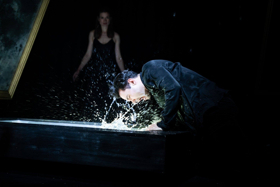
in Pictures of Dorian Gray
The Memories Season you've just announced is going to be the core of the 25th anniversary celebrations of the theatre - did you approach it differently?
Obviously, I was aware that it was going to be our birthday season. To that extent, it created a little pressure to make sure that we were celebrating it in style, I suppose, and to make sure that we had within a single season a range of work. Our programming is characterised by range; it would have felt very wrong to only do rediscoveries or only do new work, or to have something that would only appeal to a particular part of our audience.
We have a rediscovery, a quite heavily adapted Shakespeare, an absolutely brand new play, and an almost new one, certainly a London premiere. That feels quite typical of our range: the fact that we'll put writers in the middle of it, a lovely array of parts for actors, the design will be really contrasting... I wanted contrast, but I want that in all our seasons, to be honest. I like it when plays can talk to each other in a conversation, which is why we're programming in blocks and often with a kind of theme.
If you see lots of our work, there should be a sense that the plays talk to each other in some respect. The best theatre is conversational - and that could be a conversation between the programming and the audience, but also between the plays. I think you can create conversations around certain themes or even figures and just circle them with plays. It can be really exciting.
This isn't the first time you've tackled The Picture of Dorian Gray - what made you want to go back to the material?
To be honest, I have a really long history with Dorian Gray. I've had several productions, often commercial ones, that have not happened. Like all directors, the visible bits of my career are the tip of the iceberg. And then there's the seven out of eight projects that actually don't happen. There are the ones you only have conversations about, or funding doesn't come through, or you can't get the star actor for enough weeks, or whatever it is.
Then, three years ago, completely out of the blue, I was asked to do Dorian Gray for English Theatre Frankfurt, where I've done lots of work. My agent laughed a lot when she was offered it, because she was aware of all the other Dorian Grays that hadn't happened.
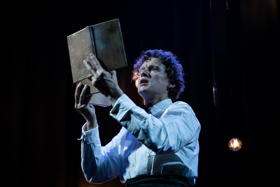
Pictures of Dorian Gray
I really enjoyed it - it was very classy and clean, with a clever adaptation co-written by Merlin Holland, who is Wilde's grandson. But I felt like it's such a rich story that I had some unfinished business with it, in some way.
I'd seen and read and looked at, for the most part, two kinds of adaptations of Dorian Gray: one is Victorian-set and engages very heavily with that late Victorian world, the other is the radical update that brings it to now, set in a photographer's studio or very directly about selfies and internet culture. I felt like there was something in it that was more primal and more mythic that could happen at the root of it.
We'd been working with this writer called Lucy Shaw on a couple of her original plays at Jermyn Street; we hadn't staged them yet, but we were working with her quite a lot. She writes about myth and her work is very poetic - she uses language in quite an extraordinary way, which might remind you a little bit of Beckett or Sarah Kane or Caryl Churchill, but it's very much her own voice. It was about putting Lucy and Wilde together, that was part of the point. We commissioned her and sort of asked her to do whatever she wanted - we only told her how many acts she could have!
All in the hopes that something would come out that was very poetic and spare. It's very different from many adaptations I've read. It feels like she really engaged with Wilde at quite a deep level. She's done a lot more than that classic adaptation thing of "What's the quickest way through the story?" - although she has done that in 90 minutes. She's somehow got into a rich conversation with Wilde about all the things that the novel's about.
The Picture of Dorian Gray is a very well known story - why is this production different?
It explores the myth of Dorian Gray. It digs into the roots of what the portrait is and what the portrait is for. We all know that there's a young person called Dorian Gray who gets painted, the portrait goes to the attic and gets older. But "What is that?" is the question this production asks. What does it mean to split yourself into two selves: one of which is aestheticised and moved through life like a piece of art, shorn of all the guilt and shame, and then you have a separate place to put all your guilt and shame - the portrait.
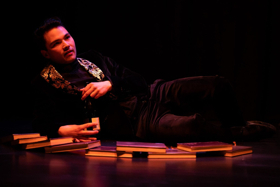
That's what really happens to it - everyone remembers that it gets old, but actually the real point about the portrait is that it bears the marks of all his sins. That's its real job. Every time Dorian does a bad thing, it's the portrait that gets marked.
I think that issue is really fascinating. It's human nature: the way we try to split ourselves into different people instead of accepting that we're all quite messy and flawed and have good and bad, angel and devil in all of us.
The adaptation Lucy has worked on is also very much about art - how we make art, and how we get to make it. The way she focused on that aspect of the story is really compelling. It's a deeply Wildean concern; it's not necessarily her own take, but it's focused on it in a very laser-like way. What's the cost of turning life into a work of art?
Did the fact that the main characters represent different aspects and perceptions of Wilde himself influence you in wanting to present the story in four different ways?
I think it has. The novel has this quality that's like a jewel - you turn it around and you see different sides. That's actually what the yellow book, which is the book within the book, does as well: it poisons Dorian and turns him mad. I think it does come directly from the novel's shifting quality, in that way.
There's a lovely quote from Wilde: "Basil Hallward is what I think I am: Lord Henry what the world thinks me: Dorian what I would like to be" - and there's something about that idea that we each have a little of all of those characters within us at different times. It's a very interesting idea.
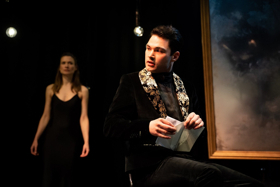
in Pictures of Dorian Gray
Why do you think swapping genders and actors creates such different dynamics?
I didn't know what impact it would have on this story. It is different, and it is more different than any of us saw coming. We did it as an experiment - the four versions are the same in terms of the staging and all the words they say. There is one difference, which I won't give away, but there is one difference in staging near the end and that's to do with the actor's choice. Nothing to do with their gender, but purely to do with the actors who play Dorian wanting to take the ending in different directions.
Apart from that, the productions are the same, and it is amazing how different they feel. It's moment after moment, scene after scene. It's big waves and small waves and waves that are unsettling and make you question lots of things you saw.
A couple of the actors have said that it's made them rethink about how they've always thought about gender. I'm not a gender theorist and I'm not an expert - I'm just a theatre person doing an experiment. I think the voice we're waiting for is the audience's; that will determine how it feels. But they are really different.
In brief, here's an obvious example with Picture A. This is the version cast with Dorian as a young man, Basil is a female artist and Henry is an older woman - and that feels really different from Picture C, with Dorian as a young woman, Basil as a male artist, and Henry as an older man. Same words, same places on the stage, yet they feel really different in ways that are not always what you would expect. Maybe it will feel unique to each audience member as well - it's waiting for them for the next part of the conversation.
It isn't just about gender too - it's also the fact that you've got two very different actors playing Dorian and two different actors playing Henry, or Basil, or Sybil. They're not only their gender but they're obviously also different actors with different obsessions, and different histories, and different things that they're bringing to that part. It would be very difficult in any kind of scientific way to go "What's the bit that makes me feel like that? Is it because it's a man or a woman as opposed to because it's Stanton Wright or Helen Reuben?" It's very hard to define.
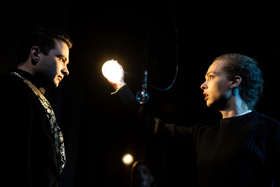
in Pictures of Dorian Gray
Do you think gender-swapping is becoming a trend?
I think it's brilliant, in general. Like anything in theatre, you can do it well or badly. You can do it thoughtfully or provocatively, in a way that shines a new light on old texts or you can do it in a way that it is clichéd and not particularly revelatory. It's like any other theatrical device. It's a new thing we are discovering. I mean, it's not even new, is it? Sarah Bernhard playing Hamlet...
In general, I think it's really exciting: the way that it's opening up texts and how we see them. I've noticed that the first trans actor is about to play Hamlet - it's really interesting to watch these plays that we've seen in such ways for so long in different ways. It's exciting! Dorian Gray, a story about some Apollonian blond white man, is in this version of the story a male actor of colour and then a female actor. When it's done well, I think it's really exciting.
If somebody asked me to do Hamlet now, or Lear now, it's really lovely to think that I have those options. And it doesn't necessarily mean that I would do Lear or Hamlet with only a female actor, but how lovely that instead of the Lears I've watched all my life, many of whom have been absolutely wonderful, I could have a Lear who doesn't at all look and sound like that and can reverberate in different ways.
Do you think at this point it's important to rework classics in order to make them relevant and for them to resonate with modern audiences?
I think quality is relevant. Whatever story you tell, it has to be told in whatever way it feels honest and truthful to you and in whatever way you think it's going to be most compelling. I've done now a little string of Strindberg plays in extremely naturalistic productions. You could call those traditional, if you like, but I would argue that the style of those shows is a blend of classical and modern in a sort of the extreme naturalism. I didn't set out to do them that way because it felt more or less relevant. It just felt honest and like it would be the most compelling production that we could do. And the one that would have a more direct impact on the audience.
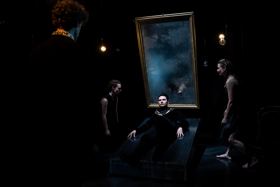
I don't think that deconstruction is always bad or good. It can be done well or badly, again. We've been deconstructing text for a long time, it's not a new thing. We are in a particular wave where it's very fashionable. It can be done with huge skill and integrity - and they're not the same thing - or it can be done badly in a way that makes it really hard to see what the play is about, that stops the play from really speaking.
This Dorian Gray is made with a specific cast and a very stripped aesthetic and a design that's not really Victorian, but that's not intended to make it more relevant. That's the most honest and powerful way that I can see my way through it.
If it works, it works; if it doesn't, it doesn't. But I think chasing your audience with a flag marked "relevant" leads to dishonest work. I think you have to approach the play and grapple with it. If it comes out simple, it comes out simple; if it comes out fancy, it comes out fancy. I have no problem with any of those approaches unless you can somehow smell that there's something underneath. It's about why you do it rather than how.
We all fail all the time, we all try things that don't work - it's part of what we do. The gender-switching thing is because it feels like a really exciting way to get into the middle of this text and also to say that this is not a story just about a white man. It's not. It's like the splitting of the self. What to do with your guilt, where to put your shame, what about getting older, the complexity of human desire... You cannot possibly argue that those things are limited to just white men. It's just that Oscar Wilde happened to be a white man and white men had more opportunities to make art.
What's the biggest challenge this project has presented?
The role-switching is really hard, because every actor has to learn two parts. There's a lot to learn for four actors in 90 minutes - it doesn't stop. Learning two tracks and then playing opposite to two people is technically really hard. Rehearsals were hard work.
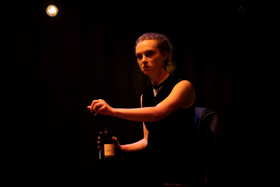
What would you like the audience to take from it?
A sense of magic. I'd like them to feel like you've got into some kind of magical hot air balloon at 7:30pm and landed at 9 o'clock, but you don't really know what's happened in between. It should feel like a dream. Or like a trance.
That's quite hard to achieve, because every single little tiny bump, you have to make sure it doesn't exist anymore. It's not the sort of play when you can improvise a line and "Oh God, I've burnt my toast! Never mind!" It's not the sort of work that can take that kind of thing. It has to be really seamless. I'd like them to come away feeling stirred and provoked and excited and thrilled. It doesn't have a message, it's an exploration. A 90-minute magic ride.
Three adjectives to describe the project?
Magical. Seductive. Beautiful.
If someone were to be able to see only one, which one should they pick?
I cannot answer that! It's like asking me to pick a favourite child, a horrible question! [Laughs] No, I don't think I can answer that. What I would say is, all four versions are really interesting. They all shine a different light on the play. Don't worry too much about which one you see because they're all the same production. It's the same story. Go with whichever night you're free...
Or if you happen to find a combination that looks interesting to you, go for that. To be honest, you wouldn't be able to pre-judge from the combination what they're going to be like anyway, so you might as well pick one. Or all of them!
Pictures of Dorian Gray runs at Jermyn Street Theatre until 6 July.
Photo credit: Sam Taylor
Comments
Videos

